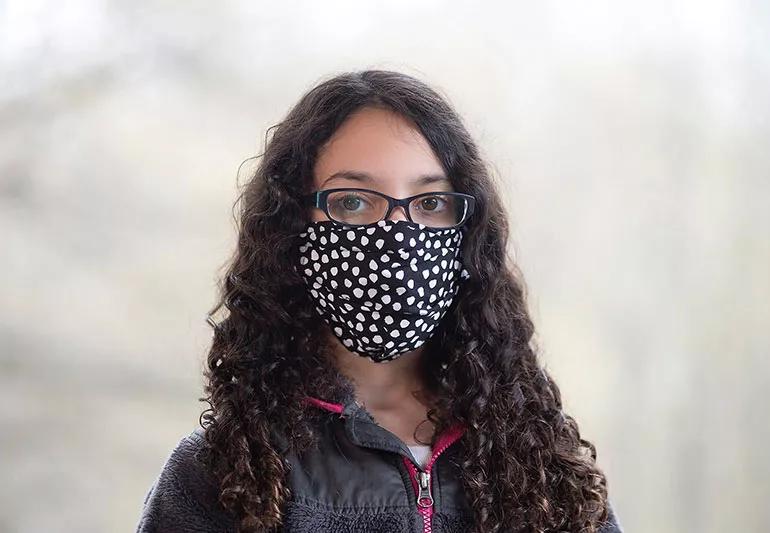It's all about protecting others

Image content: This image is available to view online.
View image online (https://assets.clevelandclinic.org/transform/84f3cfc2-dbaf-4fd6-bc52-b49143188c4a/Face-Masks-Coronavirus-770x533-1_jpg)
Teen girl wearing cloth face mask
One big change as a result of the COVID-19 (coronavirus) pandemic is the increased use of masks in public. As the outbreak continues and parts of the country reopen, many localities and businesses are suggesting, even requiring, the wearing of masks or other types of face coverings to help prevent the spread of the virus.
Advertisement
Cleveland Clinic is a non-profit academic medical center. Advertising on our site helps support our mission. We do not endorse non-Cleveland Clinic products or services. Policy
While medical-grade masks such as the N-95 mask provide the best protection against the spread, they’re hard to find and are mostly reserved for use by front-line healthcare workers. So many of us are wearing homemade masks — whether made ourselves or via friends or Etsy — made from cloth or even improvised masks made from scarves or bandannas.
But how effective are they in protecting you from the virus while wearing one? And how can they protect those around you?
We asked Steven Gordon, MD, Chairman of Cleveland Clinic’s Department of Infectious Disease, and pulmonologist Raed Dweik, MD, Chairman of Cleveland Clinic’s Respiratory Institute, about the science around these masks and why wearing them is important.
Dr. Dweik confirms that those homemade masks, often made of material like cotton, won’t do much to protect you from inhaling particles that carry the virus. But they do protect wearers from possibly spreading the virus to others.
“There is evidence that such masks reduce the exhaled aerosols from infectious, but asymptomatic, individuals.” he says. By blocking the exhale of virus particles in to the air around you, your mask is keeping the virus from spreading.
Additionally, the masks serve as a really helpful physical barrier when you cough or sneeze. “Those actions can propel this cloud of droplets from you up to 25 or 26 feet,” he says. Your mask can “disrupt” that cloud and keep those virus particles from traveling.
Advertisement
As for how we know this, Dr. Dweik explains, ”Our normal exhaled breath consists of tiny water droplets and fluid from the lining of the lungs that carries dissolved bacteria, viruses, proteins, metabolites and other compounds. As they enter the air, the aerosols begin to dry and, ultimately, only the dissolved materials remain.”
According to a pair of recently published journal articles, he says, those particles and materials collect on the inside of your mask and form a layer which attracts more particles. The studies showed that even after the masks had dried, those dissolved materials were still on the mask.
Both studies found that masks captured a wide range of proteins that are actually smaller than coronavirus particles, meaning, says Dr. Dweik, it’s reasonable to assume the masks are also capturing those larger coronavirus particles.
As businesses reopen and employees return to work, masks can play a pivotal role in helping block the spread of the virus, especially from asymptomatic carriers. The more people in a given space wearing masks, the less viral particles are making it into the space around them, decreasing exposure and risk.
Not that they’re a total fix. As Dr. Gordon notes, “The Centers for Disease Control and Prevention (CDC) says masks potentially help prevent transmission when used as a complement to social distancing.”
Masks, he says, should be used in conjunction with social distancing, not as a replacement of that practice.
Advertisement

Sign up for our Health Essentials emails for expert guidance on nutrition, fitness, sleep, skin care and more.
Learn more about our editorial process.
Advertisement
The short answer: It’s complicated, but the basic care precautions still prevail, like washing your hands and isolating if you’re sick
They can feel like a typical headache or a migraine headache, but the pain can last for weeks to months
Any large social gathering — from a family birthday party to an indoor music concert — has the potential to spread serious infection
It’s important to connect with a healthcare provider, get quality sleep and balance your activities with your energy levels
Just like the flu, COVID-19 will continue to evolve every year
The duration varies, but symptoms can linger for a few days up to a couple weeks or more
Vaccination is best for prevention, but if you get sick with COVID-19, treatments are available
The virus lives best in humans, but it can last on hard surfaces, like doorknobs and railings
Type 2 diabetes isn’t inevitable with these dietary changes
Applying a hot or cold compress can help with pain
Pump up your iron intake with foods like tuna, tofu and turkey